Crusader Weeding Out Environmental Racism
By Stacy M. Brown NNPA Newswire Senior National CorrespondentVernice Miller-Travis has consistently recognized racism, including how race has played a significant role in environmental policy.
She’s the vice chair of Clean Water Action’s board of directors, executive vice president for environmental and social justice at Metropolitan Group, and co-founder of We Act for Environmental Justice.
Miller-Travis said it’s her job to analyze data from the U.S. Environmental Protection Agency’s list of national priorities.
In that way, she’s able to keep abreast of hazardous waste sites in the United States, including the ones that pose an immediate health and environmental threat.
“You get to see the pattern,” Miller-Travis told National Newspaper Publishers Association (NNPA) President and CEO Dr. Benjamin F. Chavis Jr.
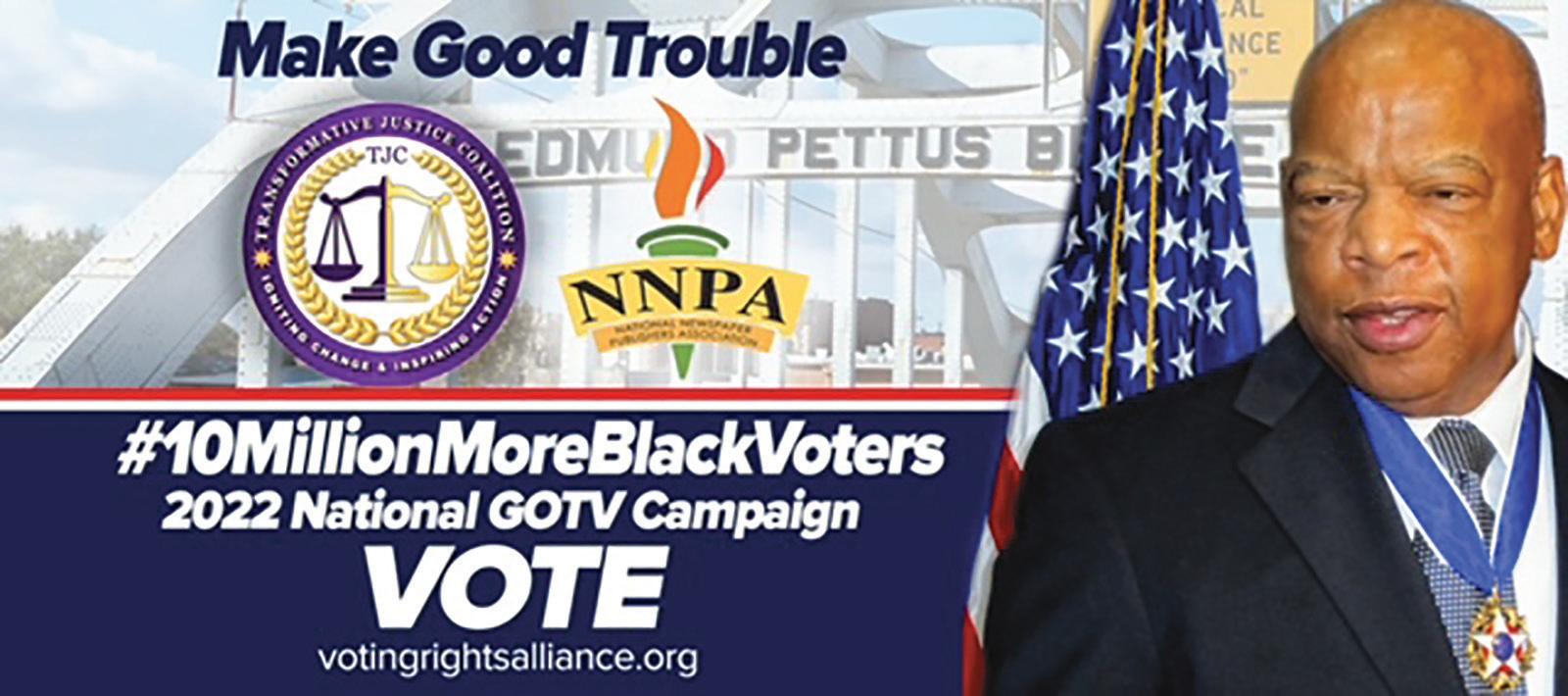
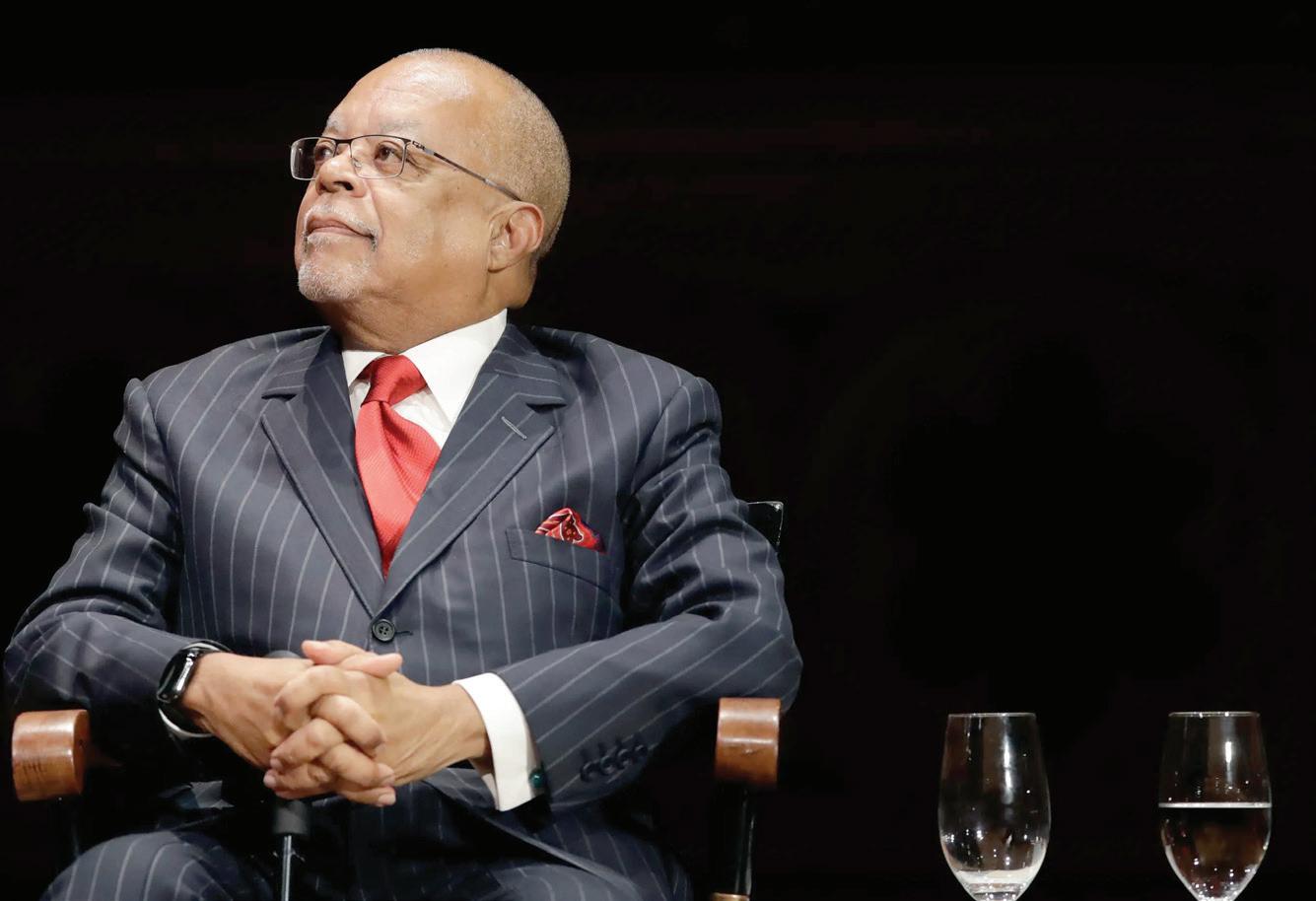
“The pattern around the racial composition of who lives in a particular place in proximity to a hazardous waste site is not random,” she said during a riveting conversationinside NNPA’s state-of-the-art television studios in Washington.
The full discussion will air on Chavis’ PBS-TV Show, The Chavis Chronicles.
And when there’s any pushback, Miller-Travis stands at the ready.
“When they ask whether they’re being accused of being racist, I tell them that what I’m saying is that your policies you utilize have an unequal impact that people of color are always adversely affected, not white people.”
Born in 1959 at New York’s Harlem Hospital, where both her parents worked, Miller-Travis said she spent a lot of time at the famed health center.
She attended Barnard College before earning a political science degree from Columbia University’s Schoolof General Studies.
“I started as a researcher working for the civil rightsdivision of a small Protestant Church known as United
Vernice Miller-Travis
Black Californians Prioritize Health, While System Fails to Prioritize Black Californians
Maxim ElramsisyCalifornia Black Media
The California Health Care Foundation (CHCF) has released a study that found Black Californians are highly engaged with their health care, are active in advocating for their health and have strong and clear opinions about how the healthcare system can be improved.
“I think it’s surprising because of the pervasive myths about noncompliance among black patients” said Shakari Byerly, managing partner of EVITARUS, a Los Angeles based Black-owned public opinion research firm who
designed, conducted and analyzed the research. “The fact is that our traditional foods may not be as healthy. While that may have some degree of anecdotal resonance, what we’re seeing broadly is that people are working very hard.”
The study was staged in three different phases intended to get varying levels of insight from different cohorts of Black Californians.
Phase one consisted of hourlong interviews with 100 individuals to understand their views on health, perceptions of discrimination, and their vision for an ideal healthcare system.
In Phase Two, the researchers conducted 18 segmented focus groups to explore structural issues in the health care system.
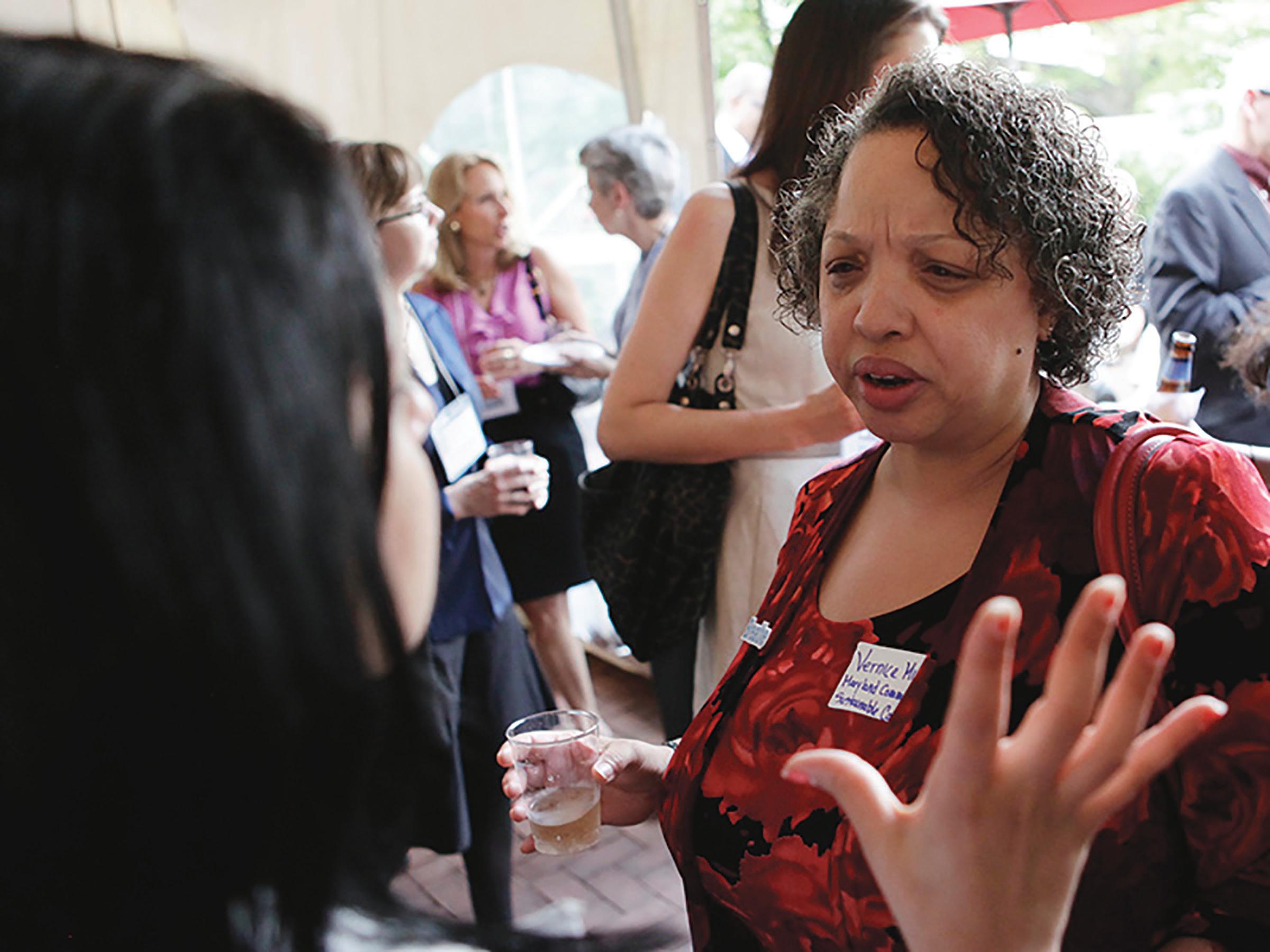
In Phase Three, 3,325 Black Californians were surveyed to determine how well the findings in phases one and two captured and represented the views of the general population of Black Californians.
The data that was collected showed that 90% of Black Californians say that they have health insurance coverage, and 92% of respondents said that they have seen a doctor or healthcare provider in the last year. Most
Votercade with Goal of 10 Million More Black Voters
By Stacy M. Brown NNPA Newswire Senior National Correspondent

The bar is set high: 10 million more Black voters. That’s the goal as the Transformative Justice Coalition (TJC), the National Newspaper Publishers Association (NNPA), Rainbow Push, the Hip Hop Caucus, and others set out on a bus tour across the nation to blunt voter suppression and misinformation ahead of the allimportant midterm elections.
“The buses are rolling … Minneapolis is the first stop,” declared Barbara Arnwine, the president and founder of the TJC, an organization known for its contributions to critical justice issues.
“We believe voting is a celebration,” Arnwine continued during a lively news conference at the Press Club in Washington, D.C.
The conference included remarks by Attorney Daryl Jones, NNPA President, and CEO Dr. Benjamin F. Chavis, Jr., Rainbow Push Coalition Executive Director Bishop Tavis Grant, Black Voters Matter Co-Founder Cliff Albright, African American Policy Forum Executive Director Kimberlé Crenshaw, National Organization of Concerned Black Men CEO Dr. Karen McRae, Virginia K. Solomón of the League of Women Voters, and Hip Hop Caucus Executive Director Attorney Tanya Clay House.
“We want people to celebrate when they vote,” Arnwine insisted.
“We call it a celebration for every time we do a votercade. We have a Celebration Village.”
Arnwine said in one city; the mayor informed the coalition that voter turnout doubled after the votercade visited.
“We went to another area in the poorest zip code in Milwaukee – one of the poorest in the nation,” Arnwine continued.
“They had such a small polling site and didn’t expect anyone to turn out. But, when we finished, they had more people vote in that one day after the votercade than typically during the entire early voting season.”
Chavis, who has pushed the hashtag #10millionmoreblackvoters, reminded everyone that the midterms were just a few weeks ago.
“We are going to all the major states, places where we know we can make a difference,” Chavis declared.
“This tour is designed to make sure we awaken a lot of the sleeping giants in our community.”
He continued:
“We believe that we can get 10 million more Black voters. That’s a large number, but we believe that number could make a difference. Democracy is on the ballot on November 8. Racial justice is on the ballot on November 8. Climate justice is on the ballot, environmental justice is on the ballot, economic justice, and equity is on the ballot, and preventing far right-wing groups from banning votesis on the ballot.”
Arnwine added that the 25-city Arc of Voter Justice Tour is designed to ensure everyone understands that citizens’ right to vote is their voice.
During the votercade, participants will register to vote and check their voting eligibility while enjoying good food, music, games, and banned books as the coalition seek to transform voting and the voting experience.
“A great democracy does not make it harder to vote than it is to get an assault weapon,” Bishop Grantdemanded.
“What is so dangerous about Black and Brown people who vote? What’s so dangerous about standing in line with a bottle of water or food or showing up early to vote?”
The Bishop said the danger is that “it shifts the power scale, and the have-nots have an opportunity to have their fair share.”
“A right is not something someone gives you. It’s something that someone cannot take away from you. That’s what this is about. It’s about restoring the right and the dignity of the voter. If your vote didn’t matter, suppression wouldn’t try to suffocate it. We need 10 million more voters.”
PA Apologizes for Experiments on Black Inmates
PHILADELPHIA (AP) – The city of Philadelphia issued an apology Thursday for the unethical medical experiments performed on mostly Black inmates at its Holmesburg Prison from the 1950s through the 1970s.
The move comes after community activists and families of some of those inmates raised the need for a formal apology. It also follows a string of apologies from various U.S. cities over historically racist policies or wrongdoing in the wake of the nationwide racial reckoning after the killing of George Floyd by a Minneapolis police officer.
The city allowed University of Pennsylvania researcher Dr. Albert Kligman to conduct the dermatological, biochemical and pharmaceutical experiments that intentionally exposed about 300 inmates to viruses, fungus, asbestos and chemical agents including dioxin – a component of Agent Orange. The vast majority of Kligman’s experiments were performed on Black men, many of whom were awaiting trial and trying to save money for bail, and many of whom were illiterate, the city said.
Kligman, who would go on to pioneer the acne and wrinkle treatment Retin-A, died in 2010. Many of the former inmates would have lifelong scars and health issues from the experiments. A group of the inmates filed a lawsuit against the university and Kligman in 2000 that was ultimately thrown out because of a statute of limitations.
Philadelphia Mayor Jim Kenney said in the apology that the experiments exploited a vulnerable population and the impact of that medical racism has extended for generations.
“Without excuse, we formally and officially extend a sincere apology to those who were subjected to this inhumane and horrific abuse. We are also sorry it took far too long to hear these words,” Kenney wrote.
Last year, the University of Pennsylvania issued a formal apology and took Kligman’s name off some honorifics like an annual lecture series and professorship. The university also directed research funds to fellows focused on dermatological issues in people of color.
Racism Sidelines
2 CA High School Football Teams
SACRAMENTO, Calif (AP) – Two recent racist incidents involving a mock slave auction and violence against Black people have sidelined two Sacramentoarea high schools for the remainder of the varsity football season.
The Sacramento Bee reported Monday that Amador High School canceled the rest of its season because of a Snapchat group named “Kill the Blacks” and that River Valley High School in Yuba City forfeited its Friday game after a TikTok video created by players involving a mock slave auction surfaced.
River Valley also forfeited the remainder of its season. With varsity players out after the video of them acting out a slave auction surfaced, the team doesn’t have enough players, KCRA-TV reported over the weekend.
The incidents in September follow one in March where an El Dorado Hills’ Oak Ridge football player heckled a Black high school soccer player with ape sounds, according to The Bee.
“Re-enacting a slave sale as a prank tells us that we have a great deal of work to do with our students so they can distinguish between intent and impact,” the Yuba City Unified School District said in a release.
The three schools are in different school districts all outside of Sacramento, which is California’s capital city. All the schools have small percentages of Black students, the news outlet reported.
Stars Set for Black Entrepreneurs Day
LOS ANGELES (AP) – Venus Williams, Spike Lee, Tracee Ellis Ross, Shaquille O’Neal and Killer Mike are among those set to participate in a celebration of African American business success and opportunity.
Black Entrepreneurs Day, founded and organized by “Shark Tank” panelist and FUBU chief executive Daymond John, will be held Oct. 27 at New York City’s Apollo Theater and streamed live on Johnson’s Facebook page and BlackEntrepreneursDay.com.
In a statement, John said his goal for the third annual gathering remains to “inspire, educate, learn from and celebrate those that are hustling, pushing forward, pursuing their dreams and, in many cases, thriving.”
Beginning at 7 p.m. EDT, the night will include John’s one-on-one discussions with celebrity and business guests; panels on topics including building generational wealth and elevating creativity and access, and a “pitch competition” for nascent entrepreneurs. Rapper Big Sean will close the Chase-presented event with a live performance.
Black business owners and entrepreneurs can apply for $25,000 grants from the NAACP Powershift Entrepreneur Grant program created by John, with the event website open for applications through 11:59 p.m. EDT Wednesday, Oct. 12. More than $500,000 in grants has been given, according to organizers.
“Black Entrepreneurs Day provides an invaluable resource to a community that is historically overlooked when it comes to resources and funding. It is truly economic inclusion for us, by us,” NAACP President and CEO Derrick Johnson said in a statement.
John, one of the original stars of ABC’s “Shark Tank,” founded the global lifestyle brand FUBU and is a motivational speaker and author.
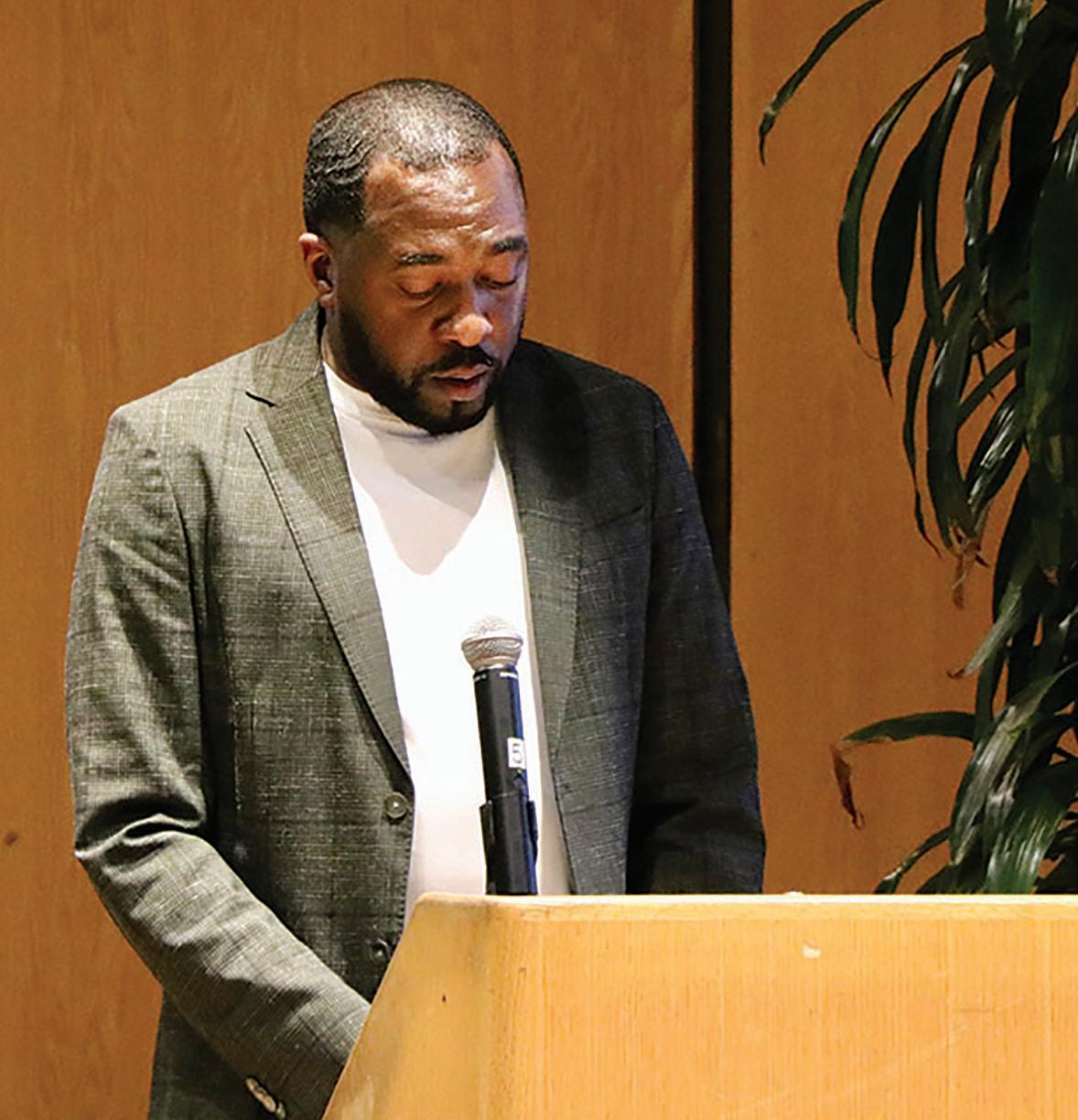
Vice President Harris Announces Slate of Actions to
Help Black and Minority-owned Small Businesses
By Stacy M. Brown NNPA Newswire Senior National CorrespondentVice President Kamala Harris used her time at Freedman’s Bank Forum to announce new public and private-sector efforts to advance racial equity.
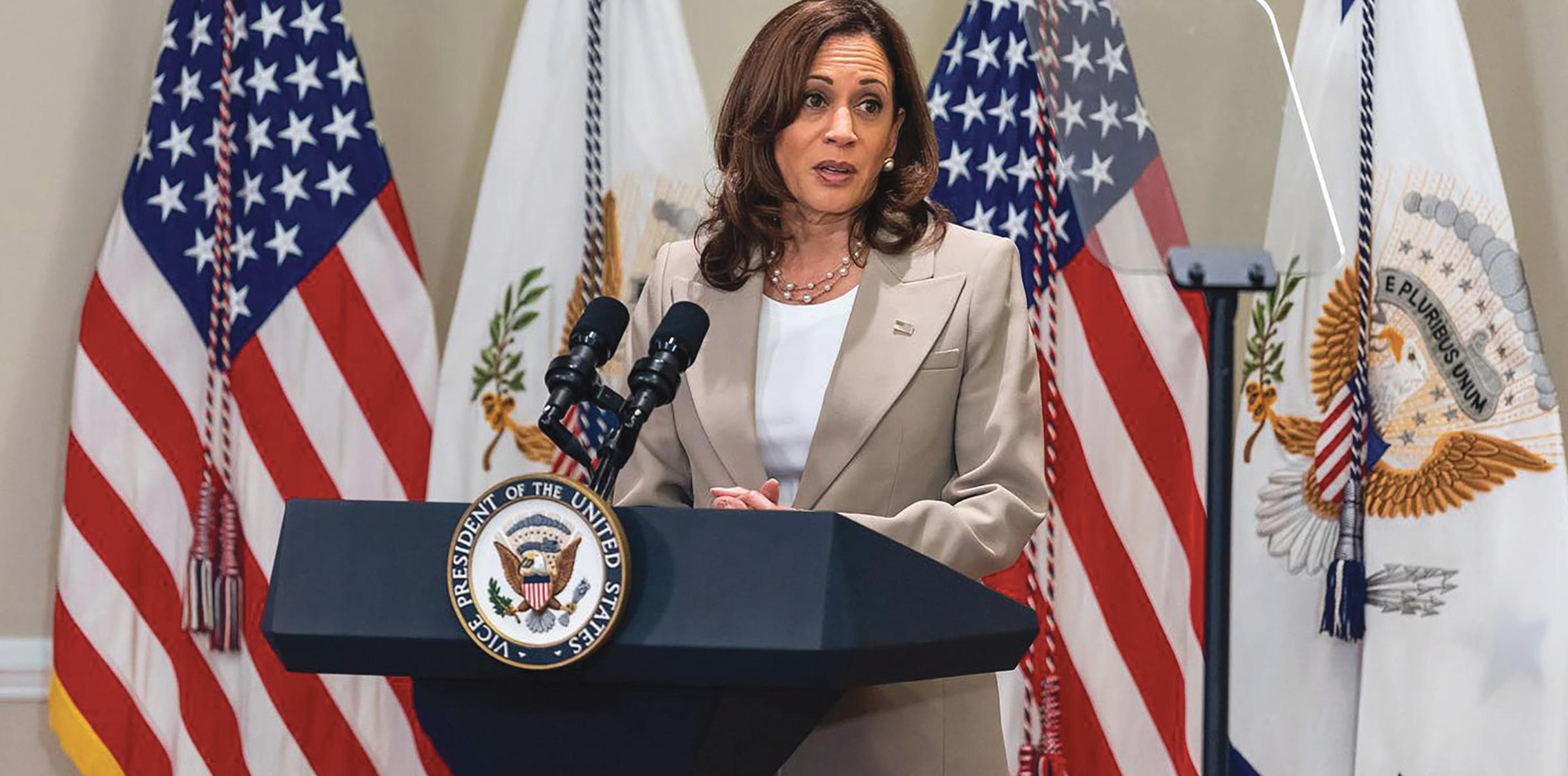
Harris said the administration recognizes the continued difficulty that Black-owned businesses have in finding funding.
She acknowledged that they routinely are the first to suffer during an economic downturn.
Among a slate of new actions by the Biden-Harris administration, the vice president announced that the Small Business Administration (SBA) would propose a rule this fall to expand its lender base by lifting the moratorium on new Small Business Lending Companies.
The action would allow new lenders to apply for a license to offer SBA-backed 7(a) small business loans.
Also, the Minority Business Development Agency (MDBA) will issue a $100 million notice of funding opportunity to provide technical assistance grants for entrepreneurship technical assistance providers to help businesses owned by socially and economically disadvantaged individuals launch, scale, and connect with growth capital.
Harris said to facilitate greater availability of smallbalance mortgages, and HUD would issue requests to solicit specific and actionable feedback on the barriers that prevent the origination of these mortgages and recommendations for increasing the volume of smallmortgage loans in federal programs.
The White House said these and a host of other new policy steps follow two recent announcements by the administration of billions of dollars in investments for Community Development Financial Institutions (CDFIs) and Minority Depository Institutions (MDIs).
The actions aim to deliver capital and resources to underserved small businesses and the community lenders who serve them, Harris stated.
“Small businesses are the engines of our economy and the path to economic prosperity for countless Americans in underserved communities,” the vice president asserted.
“Community lenders – including CDFIs, MDIs, and others – are vital to unlocking the full economic potential of these communities, turning previously sidelined talent into a source of economic growth and shared prosperity for all.”
Earlier, Janet Yellen, the U.S. Department of Treasury secretary, said the White House sought to use the Freedman’s Bank Forum to shine a spotlight on how the administration’s pandemic relief efforts supported Black –and minority-owned businesses.

The forum, launched in 2015, seeks to develop strategies to help stamp out and overcome systemic racism in the financial industry.
“Unfortunately, for too long, the small business ecosystem in underserved communities has struggled to keep up with better-funded businesses and entrepreneurs in more prosperous communities,” Harris stated.
“Entrepreneurs of color regularly report being turned away by traditional financial institutions for loans at higher
Weeding Out Environmental Racism
Church of Christ – the remnants of the church established by the pilgrims,” Miller-Travis said.
As she spoke with Chavis, Miller-Travis shared stories about the 40th anniversary the Warren County, North Carolina, protest that officially birthed the movement.
“One of the people leading that struggle was a minister in the United Church of Christ, and he called up to the headquarters in New York City and said, look, we need help. Nobody has talked to us, and the state has not reached out. There have been no briefings, no hearings, no nothing,” Miller-Travis recalled.
“And so, the national church did all they could to help and bring attention to it, but they thought, this is kind of curious.”
She continued:
“We need to see if what’s happening in Warren County is endemic to what’s happening in rural North Carolina –is it the southeast? Is it bigger than that? And they hired me as a research assistant to help identify what we would then call environmental injustice and environmental racism,which Dr. Chavis coined the term.”
“And we found that race was the most statistically significant indicator of where hazardous waste sites were located across these United States, not just NorthCarolina.”
Miller-Travis said her grandmother encouraged her to use her “practical knowledge” as a scientist to
BakersfieldNews Observer
Adjudicated a Newspaper of General Circulation Au gust 11, 1980, Kern County Superior Court Decree, Case No. 16964, Government Code 6023.
Bulk Mailing Permit 724 Bakersfield, CA 93385
Published By Observer Group Newspapers of South ern California, Inc. Corporate Office 1219 20th St. Bakersfield, CA 93301 (661) 324-9466.
Member of The National Newspapers Publishers Association, Associated Press, and The Better Business Bureau
President: Ellen Coley CEO: Jon Coley Publisher/ Editor: James Luckey Jr. Operations Manager: James LuckeyCredo-The Black Press believes that Ameri ca can best lead the world away from racial and national antagonisms when it accounts to every person, regardless of race, color, or creed full hu man and legal rights. Hating no person, fearing no person, the Black Press strives to help every person in the firm belief that all are hurt as long as any one is held back.
The Observer Group Newspapers reserves the right to publish views an opinions that may not necessarily reflect those of the staff and man agement and are solely the product of the re sponsible individuals who submit commentaries published in these newspapers. Letters, articles and comments appearing in the Observer News papers reflect the opinions of the contributor and do not constitute the opinion or endorsement by The Observer Newspapers or its staff. The Ob server Group Newspapers assumes no responsi bility for photographs, articles, letters, press re leases and unsolicited materials. Decisions as to the editing and publishing of materials are at the discretion of the Publisher and Editors. All rights are reserved on materials accepted for publica tion unless otherwise specified.
Bakersfield News Observer
Los Angeles News Observer
The Valley’s News Observer
1219 20th St. Bakersfield, Ca 93301 Mailing
Address P.O. Box 2341 Bakersfield, CA 93303
Phone (661) 324-9466 Fax (661) 324-9472
general info: observernews@gmail.
understand the circumstances affecting predominatelyBlack communities.
“Nobody was researching the lived experience in terms of environmental impacts on communities of color, on low-income communities, on tribal communities,” MillerTravis recalled.
“People were focused on endangered species, endangered water bodies – that was where the environmental community’s head was. They were working on hazardous waste issues, but no one was connecting race and environmental threats’ location. So, we were the first folks to do this.”
She continued:
“We published a report in 1987 called Toxic Waste and Race in the United States, published by the United Church of Christ’s Commission for Racial Justice, which set the whole conversation aloft in this country.
Miller-Travis later traveled to Washington, where the First National People of Color Environmental Leadership Summit took place.
She said she realized then that environmental racism
existed throughout the United States.
Miller-Travis helped to adopt the 17 Principles of Environmental Justice, which remains relevant as the world wrestles with climate change, global warming, and a woeful environment.
However, she said she’s optimistic because the BidenHarris administration has proven aggressive in its approachto these issues.
“This has been the most aggressive White House administration to address environmental injustice and environmental inequities in the history of the United States of America,” Miller-Travis asserted.
“They have policies, objectives, staff, executive orders specifically about environmental injustice in the climate space, and an executive order on addressing systemic racism across the breadth of the federal government.”They were working on hazardous waste issues, but no one was connecting race and environmental threats’ location. So,we were the first folks to do this.” She continued: “We published a report in 1987 called Toxic Waste and Race in the United States, published by the United Church
of Christ’s Commission for Racial Justice, which set the whole conversation aloft in this country. Miller-Travis later traveled to Washington, where the First National People of Color Environmental Leadership Summit took place. She said she realized then that environmental racism existed throughout the United States. Miller-Travis helped to adopt the 17 Principles of Environmental Justice, which remains relevant as the world wrestles with climate change, global warming, and a woeful environment. However, she said she’s optimistic because the Biden-Harris administration has proven aggressive in its approach to these issues. “This has been the most aggressive White House administration to address environmental injustice and environmental inequities in the history of the United States of America,” Miller-Travis asserted. “They have policies, objectives, staff, executive orders specifically about environmental injustice in the climate space, and an executive order on addressing systemic racism across the breadth of the federal government.”
Changing Clinical Trial Participation
One Study at a Time
By Stacy M. Brown, NNPA Newswire Senior National CorrespondentRecent studies have revealed that approximately 5% of Black Americans participate in clinical trials. Unfortunately, that number proves lower in the overall BIPOC community, and an organization called Idhini works to help improve Black, Indigenous, and People of Color participation.
To capture the voice of the BIPOC community and their unique needs, Idhini boasts that it provides access and equitable rewards for participation in health research.
“The main reason is trust,” Gerard Charlot, a principal at Idhini, a national database of BIPOC individuals available to participate in clinical trials, told the National Newspaper Publishers Association’s Let It Be Known live morning news show.
Officials designed the platform to provide healthinformation and resources and assist in the health and financial outcomes associated with health literacy.
“Our vision is to have medical research reflect the population it serves,” Charlot stated.
“If we are successful, increased access to healthcare and equitable rewards for participation will create positive health and social outcomes, a more diverse healthcare workforce, and higher financial rewards for health organizations.”
Idhini wants to close the gap in health research within the BIPOC community.
Charlot said the organization reduces the cost of acquiring health-related data and insights from Black and
minority communities while increasing the lifetime value of each community member’s interaction with medical research.
He said it’s 100% virtually.
“Why not make the community successful,” Charlot stated.
“The main reason there’s a problem is the lack of trust, not just from Black people, but the BIPOC community in general.”
Idhini has partnered with There Goes My Hero, a national registry that recently launched the “Color the Registry” initiative to secure more African American donors to help save lives.
Idhini helps recruit and screen individuals to ensure suitable patients participate in trials. In addition, the platform captures attitudes and sentiments toward research and converts sentiments into analysis and reporting.
A Chicago Sun-Times study revealed that patients — particularly Black and Latino Americans — now look for pharmaceutical companies to act as information brokers.
“Across social media channels, podcasts, and other outlets, they want these companies to take three major actions: help distinguish between false and accurate health care information; be realistic and honest about the realities of diseases and treatments and show what goes on behind the scenes at pharma companies,” the study authors wrote.
The authors concluded that people are reachable in a new way, and the newfound awareness of and interest in the makers of drugs and vaccines offers a pathway to learning.
“People want to hear from pharma companies,” the study authors wrote. “They’re listening and learning. They then bring this information with them to their doctors’ appointments.”
Charlot said that’s the point of Idhini.
“Major pharmaceutical companies use our stuff because it works,” Charlot stated.
“Our approach is not the Gerard way – it’s the right way.
“You have patient-centered research where it’s now all about community research. If you’re not engaging the community, there’s no value.”
Charlot concluded:
“The future of our families is not just about you; it’s about everybody you love. And the reality is that by learning more about it, by having awareness, you empower yourself to be better. You empower your community which makes you feel like you belong, and for yourself to note that you matter.”
To capture the voice of the BIPOC community and their unique needs, Idhini boasts that it provides access and equitable rewards for participation in health research. “The main reason is trust,” Gerard Charlot, a principal at Idhini, a national database of BIPOC individuals available to participate in clinical trials, told the National Newspaper Publishers Association’s Let It Be Known live morning news show. Officials designed the platform to providehealth information and resources and assist in the health and financial outcomes associated with health literacy.
PBS’ ‘Making Black America’ Details Thriving While Excluded
By LYNN ELBER AP Television WriterLOS ANGELES (AP) – America slammed the door in the face of Black progress time after time, and time after time African Americans responded by thriving in a society of their own making.
When Black doctors were excluded from the American Medical Association, they formed the National Medical Association in 1895. Black colleges, businesses, social groups and even fashion shows grew as alternatives to whites-only institutions and activities.
The result was a parallel “sepia world” in which Black lives and culture could flourish despite entrenched racism, says filmmaker and scholar Henry Louis Gates Jr., who celebrates a history of resilience in “Making Black America: Through the Grapevine.”
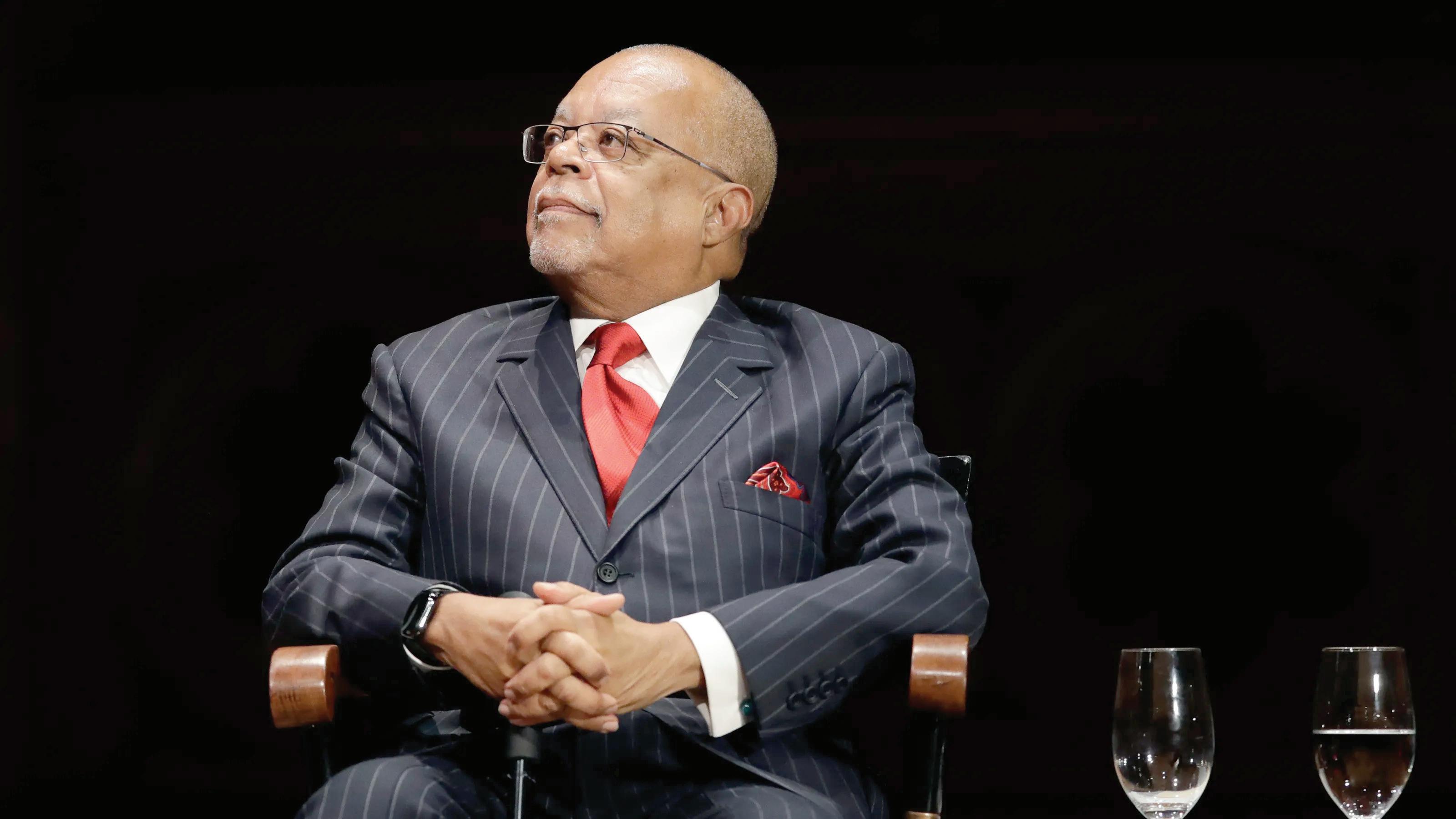
The four-part series debuting Tuesday on PBS (check local listings) and PBS online was produced, written and hosted by Gates, a steady chronicler of Black history and culture whose more than a dozen documentaries include 2021’s Emmy-nominated “The Black Church: This is Our Story, This is Our Song.” He’s also the host and producer of PBS’ “Finding Your Roots.”
“Making Black America” is infused with Gates’ selfdescribed optimism. But he considers it his “most political” series yet because it shows the “true complexity of the African American experience,” he said in an interview with The Associated Press.
“We need to have our self-image, our self-esteem
affirmed, because so many actors in our society are trying to tear down our self-esteem, trying to tear down our belief in ourselves,” he said.
Gates said the series is a rebuttal to what he calls the stereotype of a Black America consumed with white people and devoting all of its energy and imagination to fighting white supremacy.
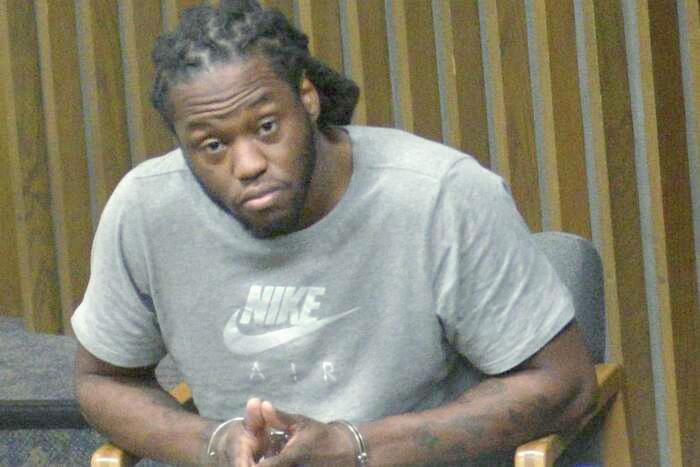
“What you do with most of your imagination is you fall in love, you raise a family, you have children, you build social networks,” said the Harvard University professor.
“This is a demonstration of Black agency, the way we created a world within a world.”
Gates compared the Black havens to those established by Jewish Americans and other ethnic groups when they were barred from employment, cultural institutions and other elements of U.S. society.
During a Q&A with TV critics, Gates delighted in pointing out that the “grapevine” in the series’ title predated the Motown hit song “I Heard it Through the Grapevine” by about two centuries: He said founding father John Adams wrote about the grapevine concept in 1775, and it was referred to by Booker T. Washington in 1901. Washington founded what is now Tuskegee University.
The vivid word broadly describes “the formal and informal networks which, for centuries, have connected Black Americans to each other through the underground, not just as a way of spreading the news, but ways of building and sustaining” Black communities, said Gates.
Shayla Harris, who produced and directed the series
with Stacey L. Holman, said that the Black experience is often sorted into either “the struggle” or abundant creativity. But business drive is also a notable part, she said.
“The Negro Motorist Green-book”, a 1936-67 guidebook to businesses that would serve Black travelers, is generally discussed in the context of the restrictions that people of color faced under Jim Crow segregation.
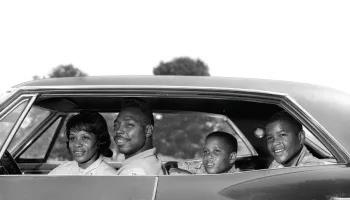
That ingenuity also was testament to the Black entrepreneurs who exemplified the saying that “Black people make a way out of no way,” Harris said. The guide was “a document of 7,000 Black businesses across the country, from restaurants to hotels to beachfronts and just any little stand that people could put together.” (The guide was central in the 2018 Oscar-winning interracial road trip movie “Green Book,” which won best picture and best supporting actor for Mahershala Ali.)
Other aspects of African American perseverance highlighted by the series and its creators:
– The barbershops and hair salons that serve as community centers. Gates said he still delights in going to the Nu Image Barbershop in Cambridge, Massachusetts, Harvard’s home town. The talk is about “what you’re anxious about, your kids, what’s in the news, of course. And you talk about LeBron (James) and Steph Curry and the Celtics. The full gamut of human emotions.”
– Excluded from professional, trade and even recreational associations, African Americans formed their own. In naming the groups, they used “national” in the titles as a “polite” way to signify the membership was Black,
Gates said. That included the National Dental Association and the National Brotherhood of Skiers. (In 2008, the American Medical Association formally apologized for decades of racial discrimination.)
– The robust number of sororities, fraternities and fraternal orders that contribute to Black social life and networking. One had roots in today’s Prince Hall Freemasonry. It began with a Massachusetts lodge initiated in 1775 by Masons from Ireland after Colonial whites rejected Hall and a handful of other Black men for membership.
– The innovative Black women who stood out in business. They included early 20th-century business mogul Madam C.J. Walker, inventor and philanthropist Annie Malone and Maggie L. Walker, who was among America’s first female bankers and who focused on the needs of the working class. To see these women succeed despite a society “that’s pushing against you and a society that’s predominately male ... was enlightening, encouraging and just empowering,” Holman said.
– The Ebony magazine-sponsored Ebony Fashion Fair runway shows that countered the industry’s overt discrimination by featuring Black models and designers for an audience that dressed for the occasion. The annual event, which was staged nationally and outside the U.S. for five decades, raised millions of dollars for charity.
Documentary Celebrates 40th Anniversary of Michael Jackson’s Thriller
By Stacy M. Brown NNPA Newswire Senior National CorrespondentWhen the Grammy Awards ostensibly snubbed Michael Jackson’s groundbreaking 1979 album, “Off The Wall,” the then-fledgling King of Pop vowed that voters at the Recording Academy would not ignore what he would offer next. On November 30, 1982, just over three years later, Jackson released “Thriller,” which earned him a record-breaking 8 Grammy Awards, including “Album of the Year.” To commemorate the 40-year anniversary of “Thriller,” the Jackson estate and Sony Music Entertainment said they’re celebrating the artistic vision that anchored the biggest selling album of all time with a new official documentary. Directed by Nelson George, the film promises to take fans back in time to the making of the album and release of revolutionary short films that redefined the music video format and captivated audiences globally. “Billie Jean” remains the most streamed Michael Jackson song and “Thriller” is the only music video that has been inducted onto the elite National Film Registry of the Library of Congress. According to a news release, the documentary features never-before-seen footage and candid interviews. The yet titled documentary chronicles the point in Jackson’s career that launched the singer into mega-stardom and created a pop culture phenomenon that is woven through the culture and continues to influence the worlds of music, television, dance, fashion and more to this day. “The release of Thriller redefined Michael Jackson, taking him from teen star to adult superstar, who
composed memorable songs, sang beautifully and reached the highest level of on-stage performance,” Nelson George said in the release. “The album, and the short films they inspired, created a new template for marrying music and image. It’s been a privilege to explore this extraordinary album and revisit its magic.” When a fledgling MTV, which programmed white rock artists almost exclusively, refused to play the video for “Billie Jean” Epic Records persisted. Once the wall came crashing down, MTV’s ratings soared, and a door was opened for a generation of African American artists. “He was MTV’s Jackie Robinson,” said cultural critic Touré, who appeared this week on the National Newspaper Publishers Association’s Let It Be Known to promote his new show, Masters of the Game. The second studio album by Jackson as a solo artist on Epic Records, Thriller captured a record 12 Grammy nominations and a record-setting eight wins. Since its debut, Thriller has sold over 100 million albums worldwide, and was the first album to be certified triple diamond by the RIAA. “Michael opened and explored emotional depths and pushed the boundaries of sonic innovation on Thriller,” John Branca and John McClain, Jackson’s estate executors, proclaimed in the news release. “In the process, he breached destructive barriers in the music industry and literally united the world through his music: there isn’t a place on this planet that hasn’t been exhilarated by the music of Michael Jackson.” “This documentary’s exploration of Michael’s process and impact is revelatory.”
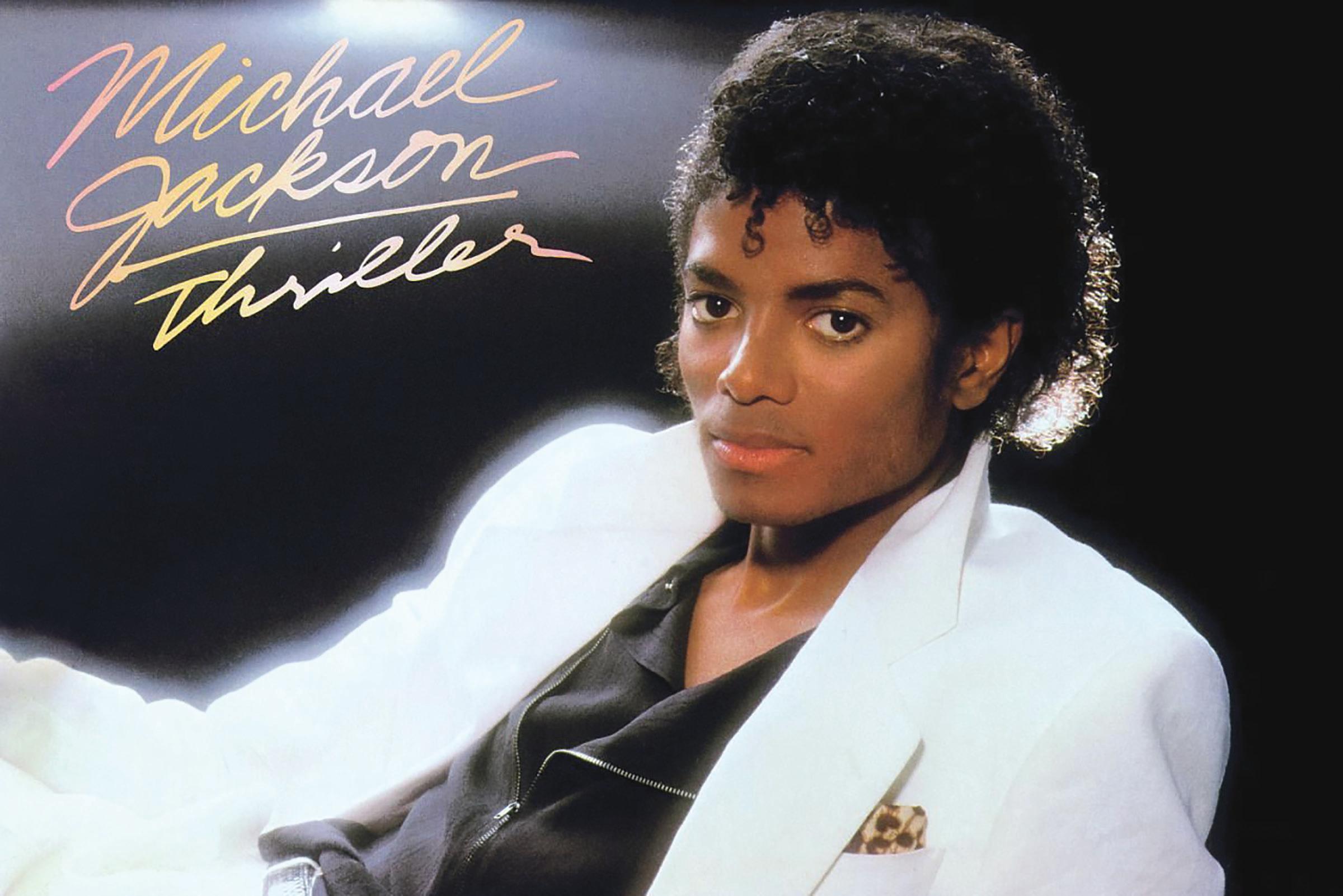
Features
Recognizing Hispanic Heritage Month:
California’s Latinos Reflect on Experiences, Accomplishments
McKenzie Jackson California Black Media
As Hispanic Heritage Month comes to a close, California Black Media writer McKenzie Jackson takes a look at the lives and accomplishments of some people of Hispanic heritage in California.
Dayane Mendoza Solis considered throwing her hat in the ring for a trustee seat on the Sonoma Valley Unified School District’s board in the upcoming Novemberelection.
The 28-year-old accountant, a graduate of the Wine Country’s public school system, says more Latino representation is needed on school boards and in government, more broadly.
In the end, Solis decided not to run. Instead, she chose to focus on her budding career as an accountant. Still, Solis said, she would like to see more Latinos in prominent positions across the Golden State.
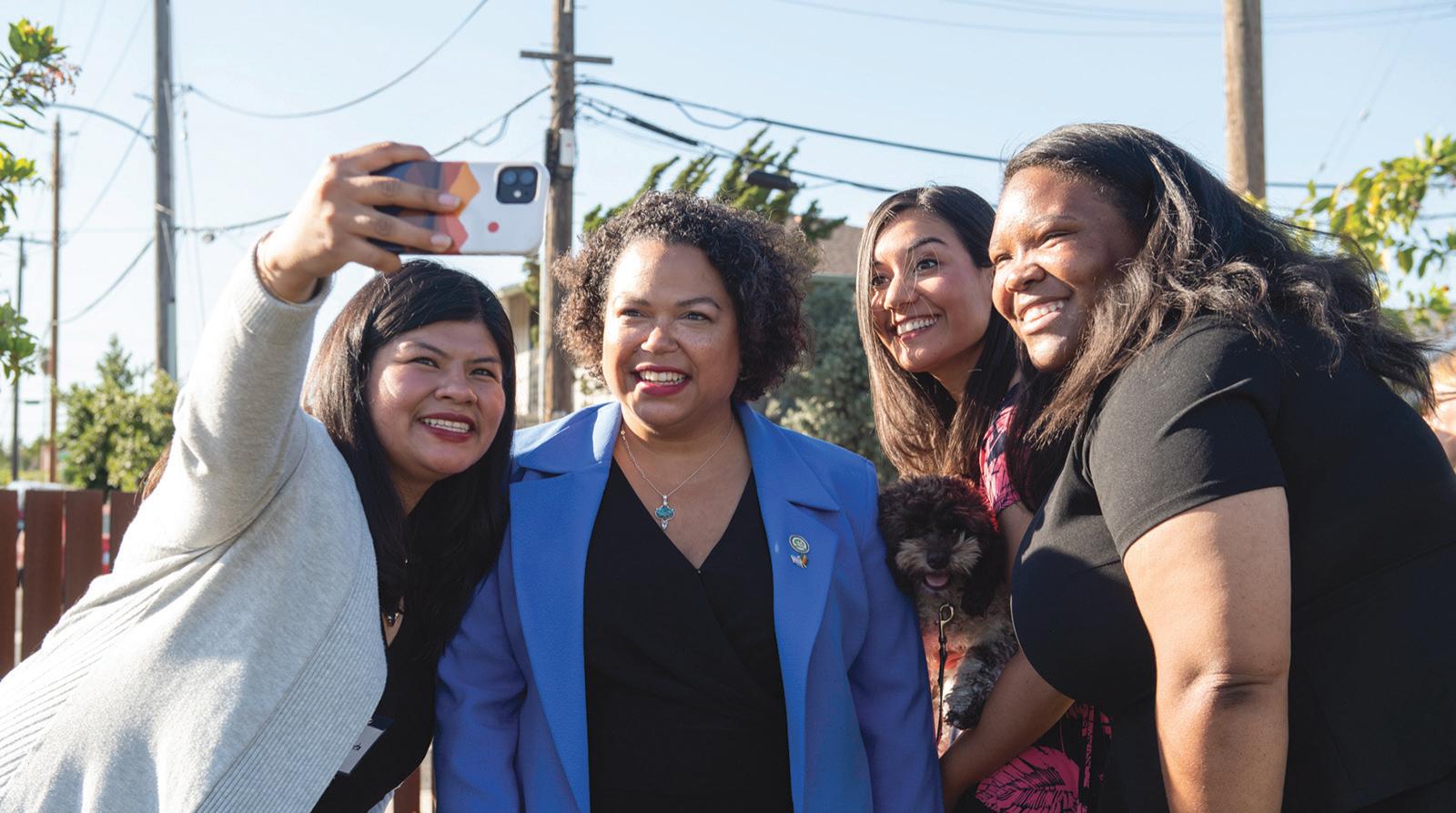
“People were so happy to know that I, a Latina, was ready to step into a leadership role,” said Solis, an admirer of New York Congresswoman Alexandria Ocasio-Cortez. “More Latino leaders are needed to step up and guide younger generations because there are so many people ofMexican and other Latin American descents in California.”
Solis hopes Hispanic Heritage Month, which runs from Sept. 15 to Oct. 15, shines a light on that.
“The Latino community is made up of hard workers, who are willing to thrive and help others in need,” Solis told California Black Media (CBM). “We have a strong presence in the state.” Hispanic Heritage Month places that work ethic front and center. The monthlong national recognition is held annually to celebrate the diverse cultures, contributions, and extensive histories of the U.S. Latino community, the second largest racial or ethnic group in the country.
Assemblymember Mia Bonta (D-Oakland) says the occasion is an opportunity to acknowledge and uplift the voices and experiences of Latinos in America.
“We are still living in a time and place where we need to make sure we elevate the experiences of Latinos,” Bonta who is a Black Latina (or Afro Latina) said to CBM. “Having a month dedicated to telling their stories, focusing on their legacies and the everyday heroes who make a difference is very important.”
According to the Public Policy Institute of California (PPIC), Latinos are largest ethnic group in the state. They are about 39.4% of the state’s population or about 15.7 million people. Non-Hispanic Whites are 34.7% and African Americans are 5.4% of the population.
The largest concentration of people of Hispanic Heritage in California lives in Imperial County (79.6%), which is adjacent to San Diego County along the southern border of California. Latinos make up 48% of Los Angeles County’s population and over 50% of the population in San Bernardino and Fresno counties. One in every four
Hispanic American call California home.
Among Latinos in California, Mexican Americans account for the largest number of people of Hispanic origin in the state (30.7%) followed by Hispanics originating from the Caribbean (0.8%) and people of Central American descent (3.0%).
Throughout California’s 170-year history Latinos have contributed to every aspect of life including agriculture, construction, entertainment, health care, hospitality, sports, and politics. In fact, people of Hispanic Heritage have been living in California since the 1600s, according to some reports.
California has been home to a number of national heroes of Hispanic heritage including labor leaders Cesar Chavez and Delores Huerta, cofounders of the organization that became the United Farmworkers Union; former and current United States Poet Laureates Juan Felipe Herrera (2015-2017) and Ada Limón; and American civil rights activist Sylvia Mendez.
The economic impact Latinos have on the state and nation was celebrated at the L’ATTITUDE conference from Sept. 22-25 in San Diego. The event allowed Latino professionals to network and share ideas. It attracted
business and political leaders and celebrities like former President Barack Obama and Cuban American singerGloria Estefan.
Obama said, “Success of the country economically is going to depend on how well the Latino community does and other quote unquote minority groups because they’re growing in importance and in strength.”
Alex Padilla, who became California’s first Latino U.S. Senator when Gov. Gavin Newsom appointed him to replace Vice President Kamala Harris, appeared at L’ATTITUDE for a conversation titled “Public Policy Imperatives for the 21st Century America.” Padilla, the son of Mexican immigrants, introduced the Senate bill, “The Renewing Immigration Provisions of the Immigration Act of 1929” to expand a pathway to permanency for millions of long-term U.S. residents three days after the event.
According to PPIC, one-fourth of the undocumented immigrants in the United States (between 2.35 and 2.6 million people) live in California.
The Senate bill Sen. Padilla introduced would allow an immigrant to qualify for lawful permanent resident status if they have lived in the U.S. continuously for at least seven years before filing an application for lawful permanent resident status and are of good moral character. It provides
a pathway to a green card for up to eight million people.
The undocumented individuals covered in Padilla’s bill after they become citizens, potentially would contribute about $83 billion to the U.S. economy annually and about $27 billion in taxes according to FWD.us, a bipartisan political organization advocating for immigration reform.
According to Padilla, America’s outdated immigration system is holding back the economy and hurting anunnumberable number of individuals.
“This could have a profound impact on millions of immigrants, some who have been living, working, and contributing to the United States for decades, by allowing them to live freely without the fear of an uncertain future,” he said.
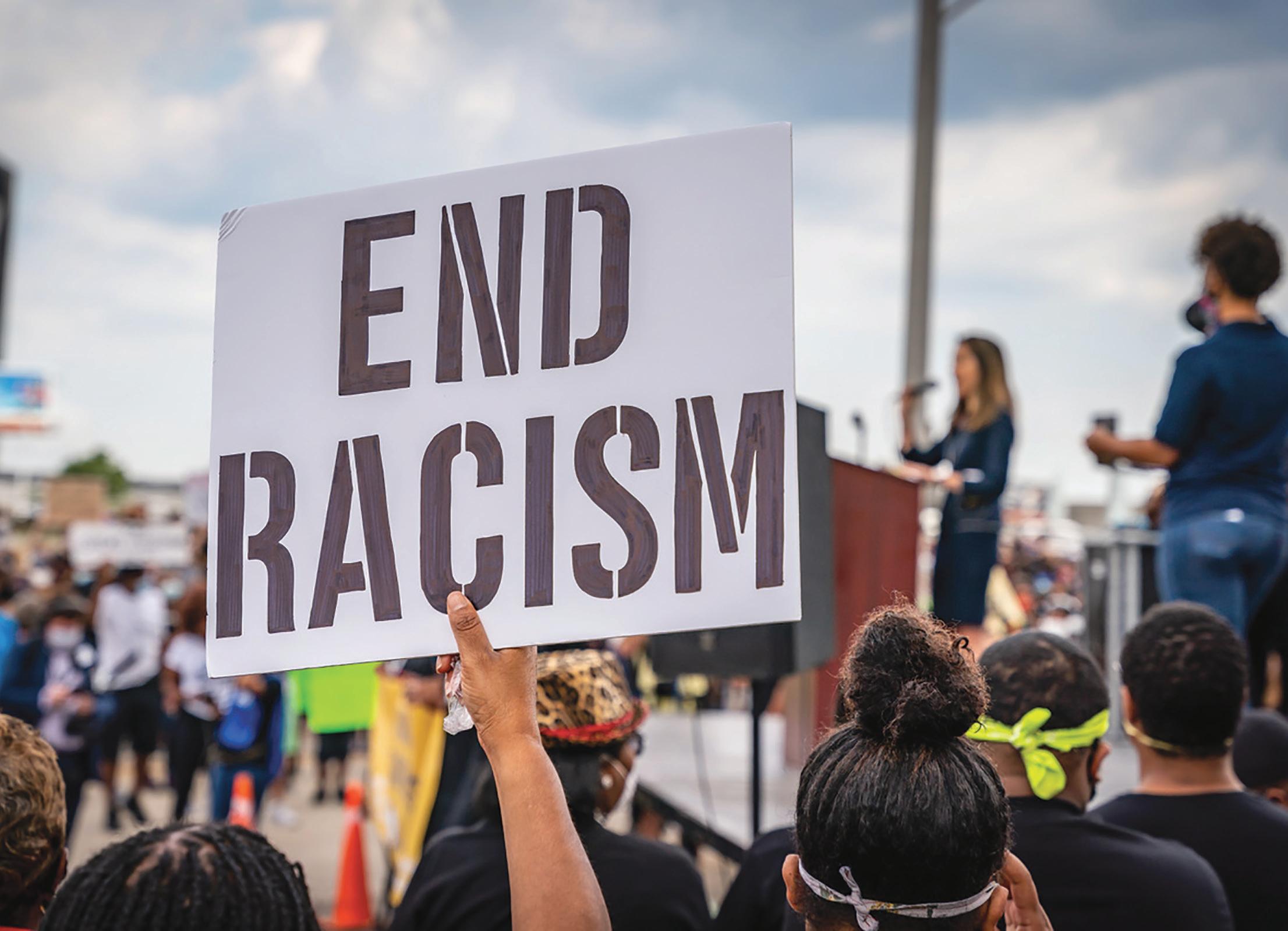
One immigrant the Padilla bill could help in the future is Yenny Soto, a 31-year-old immigrant from Venezuela. Soto crossed the Arizona border last December. She spoke with CBM about her odyssey from Panama to the U.S. Soto’s journey included multiple plane and bus ridesbefore she and nine other Latin Americans entered the U.S. The band walked through crop fields and barren lands until they met with a group of around 50 other migrants fleeing unstable countries like Cuba, Nicaragua, and Venezuela. Seeking asylum, they called law enforcement and were allarrested.
Soto was held in the custody for over a week and after being assigned a court date for her asylum plea, she landed in New York City where she has been working as a waitressand bartender in clubs and restaurants.
“I knew I had to come and work a lot since I had been told the American Dream was to work and work,” said Soto, who jokes about becoming U.S. president one day.
Ninety-nine percent of Hispanic immigrants in California come from Latin America, with 77% comingfrom Mexico.
Solis, whose family immigrated legally from Mexico, said immigrants need help getting acclimated to America.
“Families are moving to find a better life,” she said. “Mexico, in particular, has a lot of violence.”
However, Bonta said it is a misconception that immigration concerns are exclusively about Latinos. She said California’s Latino community is not monolithic.
“There is very diverse Latino community -- from Central and South America, the Caribbean and people that have been in California for generations,” said Bonta. “Latinos have an incredible history of contributing to the economy of the state.”
Solis hopes all Californians can enjoy Latino culture.
“I think it’s beautiful that it is being celebrated -- our diversity, our cultures,” she said. “I find it innovative, but at the same time I would like everyone to question what they are celebrating. Are they going to take the time to learn about Latino cultures? Are they going to make an effort?”
“This publication/project was supported in whole or in part by funding provided by the State of California, administered by the California State Library.”

High School Students Taught a Lesson for Holding ‘Mock Slave’ Auction
Athletes at a northern California high school are the latest group of students to be punished for a raciallyinsensitive prank.
Football players at River Valley High School in Yuba City were seen in a video acting out a “slave auction” involving their Black teammates. In the video, which was posted to Twitter, the African American students are seen stripped to their underwear and paraded into the locker room where their teammates are yelling and jeering atthem.
This prank cost the football team its season because the players featured in the video have been barred from participating in games. The football team now doesn’t have enough players to field a team.
African-American students make up a small fraction of the student body at River Valley High School, which is predominantly Hispanic.
According to school data, there are only 31 African-American students at the school out of an enrollment of 1,801. There are 760 Hispanic/Latino students enrolled.
Yuba City Unified School District Superintendent Doreen Osumi said the video reflected poorly on the school district.
“Re-enacting a slave sale as a prank tells us that we have a great deal of work to do with our students so they can distinguish between intent and impact,” said Osumi in a press statement.
“They may have thought this skit was funny, but it is
not; it is unacceptable and requires us to look honestly and deeply at issues of systemic racism,” she said.
These kinds of incidents happen regularly. Earlier in the month, Amador High School, also in northern California,had to cancel its football season after school authorities found several players were involved in a Snapchat thread called “Kill the Blacks.”
A similar event happened back in 1997 when a Torrance teacher tried to enact a slave auction. Student Natalie Jackson complained to her mother, who took the issue up with school administrators and the press.
Jackson said she went public with a video because she wanted to inspire change.
“Some say that I am overreacting, but they didn’t have this experience,” Jackson told the Los Angeles Times. “I don’t want to go back to my U.S. history class, but I am going back. I am going to do my work and everything that I am supposed to do, be strong and face the music. Maybe my action will break some barriers.”
“Mock slave auctions and other racist actions on the sports field have been occurring with an alarming and increased frequency in schools throughout California,” said Rick L. Callender, president of the California/Hawaii NAACP. “The CA/HI NAACP will be pushing the Stateto collect data statewide so that we can understand the prevalence of how often the activities are occurring in schools throughout California.”
Callender called on California high schools to ensure the safety of Black students and continue educating all students about the importance of Black history.
Boeing Awards $100,000 to the Brotherhood Crusade’s Proud to Be Me Trauma Informed Anti-Recidivism Initiative Program
Targets high-risk and low-income youth in Los Angeles County

Los Angeles, Calif. – Boeing recently awarded $100,000 to the Brotherhood Crusade’s Proud to be Me Trauma Informed Anti-Recidivism Initiative to support high-risk, low-income youth in Los Angeles County from re-entering the juvenile criminal justice system. The grant aligns with and supports Boeing’s Global Engagement pillar of recidivism prevention with outcomes that reduce the barriers for young men and women in communities of color that have been involved in the Criminal Justice System. The program is an engaging, culturally relevant, research-based long-term initiative that provides mentorship, youth development, outreach support, and workforce development.
“We are grateful for Boeing’s continued partnership of our Proud to be Me program, particularly as we work every day to reduce the number of youth that re-offend in our communities, by providing engaging, intentional, and culturally supportive programs,” stated Charisse Bremond Weaver, president and CEO of Brotherhood Crusade. “The initiative has been widely successful to date as rates have dramatically decreased from a baseline of 83 percent to less than 15 percent for the youth participating in our program.”
According to the Juvenile Justice Coordinating Council, Latino and African American youth make up 63 percent of the total Los Angeles County youth population, while representing approximately 90 percent of youth in the juvenile detention system in Los Angeles County.
“Being a participant in Brotherhood Crusade’s programs has given me purpose, the key tools to be successful in life, and learn the true value of hard work, dedication, and how to show up and be the best version of myself,” said one Proud to be Me participant. “I could have dropped out of school and gone in a different direction, but not only did I graduate from high school, I now understand my value and worth in this world because of them. I currently work with the Brotherhood Crusade as a youth advocate and I can pour into others the way they poured, love, guidance, purpose, and positive opportunities into me.”
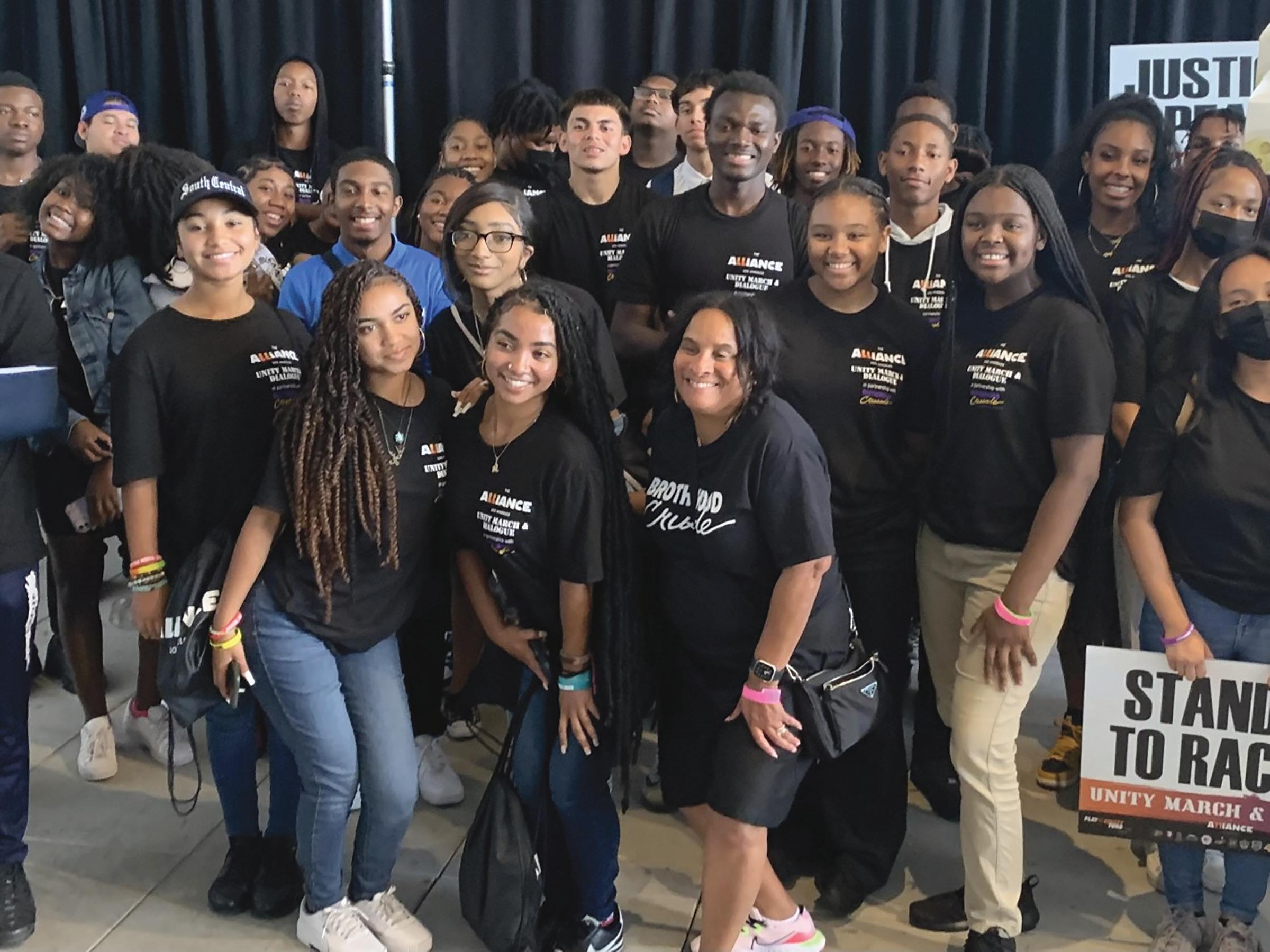
Council Members Martinez and de León Attract the Ire of The Black Community
Councilman Mike Bonin’s son was referred to by Martinez as “ese changuito,” which means little monkey, and “su negrito,” which is a derogatory term for a Black person.
Bonin is White and his son is Black.
Bonin is calling for Martinez to be removed as president of the city council and for her and de León to resign.
“We are appalled, angry, and absolutely disgusted that Nury Martinez attacked our son with horrific racist slurs, and talked about her desire to physically harm him,” Bonin wrote in a statement with his partner Sean Arian. “It’s vile, abhorrent, and utterly disgraceful. The City Council needs to remove her as Council President immediately, and she needs to resign from office. Any parent reading her comments will know she is unfit for public office.”
The racially insensitive comments and uncomplimentary remarks about their city council colleagues were made during an October 2021 meeting convened to discuss the redrawing of council districtboundaries to reflect the 2020 U.S. Census.
Martinez’s comment about Bonin’s son were directed at his behavior during a Dr. Martin Luther King DayParade in 2017. She claimed his son nearly caused a float she was on during the parade to tip over and said that someone need to “parent that kid.”
“They’re raising him like a little white kid,” Martinez said. “I was like, ‘this kid needs a beatdown. Let me take him around the corner and then I’ll bring him back.’”
All of the participants in the meeting have issued public apologies.
“In a moment of intense frustration and anger, I let the situation get the best of me and I hold myself accountable for these comments. For that I am sorry,” Martinez stated.
“The context of this conversation was concern over the redistricting process and concern about the potential negative impact it might have on communities of color,” the statement said. “My work speaks for itself. I’ve worked hard to lead this city through its most difficult time.”Martinez also said.
De León who called Bonin the council’s “fourth Black member”, was also caught saying “Mike Bonin won’t (expletive) ever say peep about Latinos. He’ll never say a (expletive) word about us.”
“There were comments made in the context of this meeting that are wholly inappropriate; and I regret appearing to condone and even contribute to certain insensitive comments made about a colleague and his family in private. I’ve reached out to that colleague personally,” de León stated in his apology.
Cedillo said, “While I did not engage in the conversation in question, I was present at times during this meeting last year.... Clearly, I should have intervened.”
Herrera in his statement said, “I didn’t step up to stop them and I will have to bear the burden of that cross moving forward.”
The three current Black city council members, Curren
Price, Heather Hutt, and Marquees Harris Dawson, issued a joint statement about the recording that said, “This is a dark day for LA politics for African Americans, the LGBTQ+community, Indigenous people and Angelenos who have put their faith and trust in local government...... The actions of our colleagues should not be tolerated and a vapid tongue has no place in City Hall. Not today, not tomorrow, not ever”
Karen Bass who’s been endorsed by Martinez for LA mayor responded to the recording by stating “Let me be clear about what was on those tapes: appalling, anti-Black racism.... All those in the room must be held accountable, and I’ve spent the day speaking with Black and Latino leaders about how to ensure this does not divide our city.”
Bass’ opponent, Rick Caruso’s statement on the racially charged comments said, “Everyone involved in this should be held accountable.” Caruso has been endorsed by Cedillo.
Jasmyne A. Cannick, who has worked as a political spokesperson and is a City Hall veteran tweeted, “I’m watching how long it’s taking all of our allies to disavow their comments and call for their resignation. I told y’all Los Angeles was an anti-Black city.”
The California-Hawaii (CA/HI) State Conference of the NAACP and the Los Angeles Branch of the NAACP are calling for the immediate resignation of Martinez, Cedillo, de León, and Herrera.
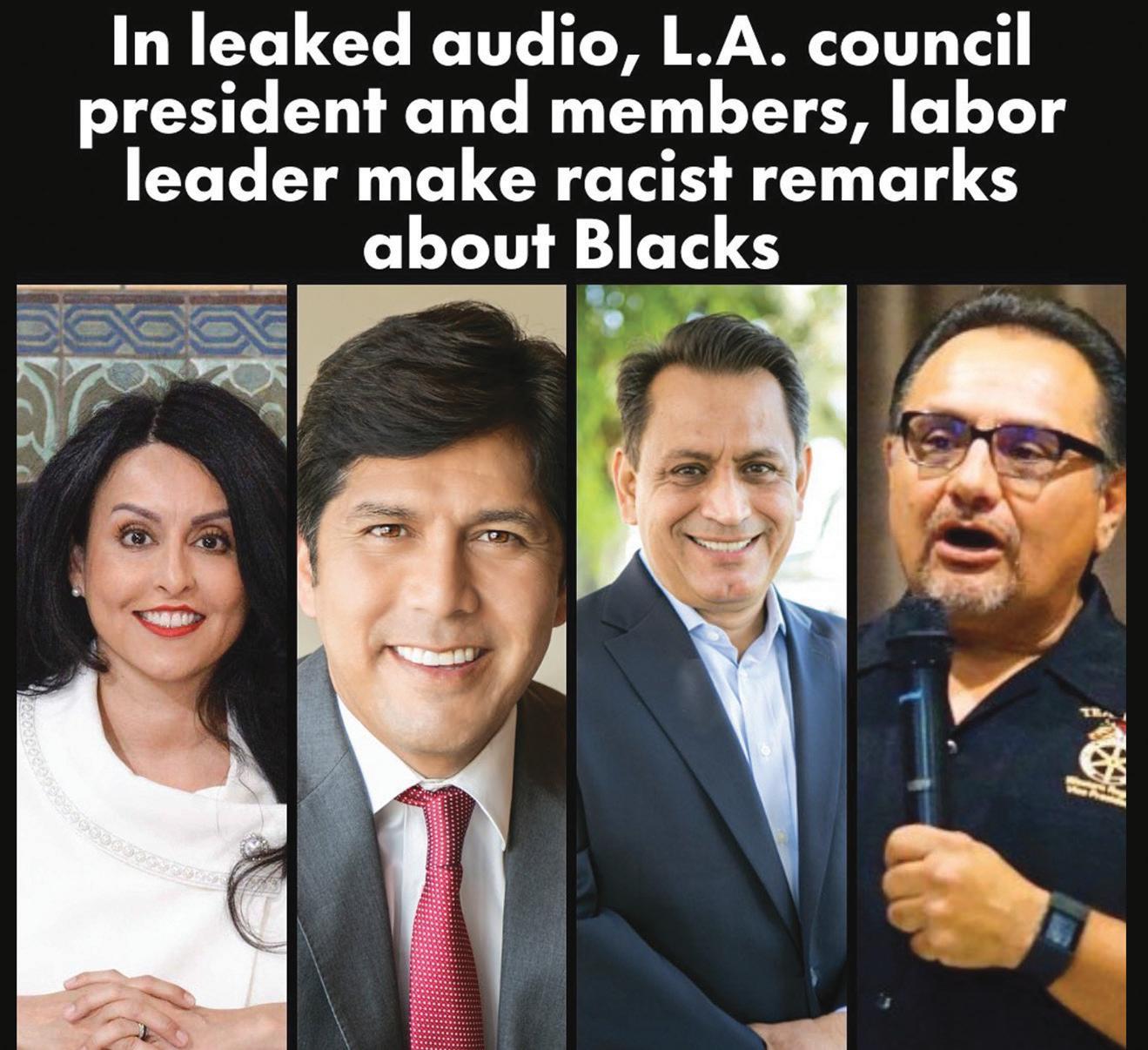
“This kind of overt racism has no place in political discourse,” said Rick L. Callender, President of the CA/HI State Conference of the NAACP.
“We will not sit idly by and allow our elected representatives to engage in these kinds of disgusting and racist behaviors,” said Latricia Mitchell, President of the Los Angeles Branch of the NAACP.
Both the NAACP State Conference and the LA Branch are asking for the City of Los Angeles to investigate, how far the racial animus has impacted hiring and other decisions of the City Council.
Story Update: Nury Martinez, resigned as Los Angeles City Council president Her resignation is effective immediately. However, she will remain a member of the council. She is up for reelection in 2024.
Martinez represents the city’s 6th district, which includes Hollywood, Panorama City and other parts of the San Fernando Valley.
Martinez said in her statement announcing her resignation as president that, “Going forward, reconciliation will be my priority. I have already reached out to many of my Black colleagues and other Black leaders to express my regret in order for us to heal. I ask for forgiveness from my colleagues and from the residents of this city that I love so much. In the end, it is not my apologies that matter most; it will be the actions I take from this day forward. I hope that you will give me the opportunity to make amends.”
Black Californians Prioritize Health, While System Fails to Prioritize Black Californians
people reported putting “a great deal” or “quite a bit” of effort into getting screenings and preventative care, tracking health indicators like blood pressure and cholesterol, and working to maintain a healthy weight. Four out of five reported focusing “a great deal” or “quite a bit” on mental health.

One in three Black Californians and nearly half (47%) of Black women say they experienced inadequate treatment for pain by their health care provider. “We’ve heard story after story of Black women in particular, talking about not being believed, having their pain and agony inadequately treated,” Byerly said.
Nearly one in three Black Californians was found to be treated unfairly by a healthcare provider because of their race or ethnicity, and more than one in four Black Californians avoid care due to concerns that they will be treated unfairly or with disrespect. Unfair experiences are most common among Black Californians with mental health conditions, disabilities, identifying as LGBTQIA+, and women.
The study found that Black Californians have clear opinions on how to improve the health care system. Strong majorities (75%<) expressed that it is extremely important or very important to increase Black representation among health care leadership and in the healthcare workforce. The majority in each age group said that it was at least somewhat important to have a Black or African American Doctor. According to data released by the American Medical Association, 10% of medical school matriculants in 2021 self-identified as Black, or a combination of Black and Asian, Hispanic, or White.
“There needs to be additional support. Financial support. Upfront financial support, for those who want to be doctors. In nursing there’s also a need for financial support, but there’s also not a standard for advising people about the most efficient, most successful pathways to nursing careers… That’s a problem that can be corrected,” CHCF senior program officer Katherine Haynes told California Black Media. “There is another issue and this has to do with the environment in which physicians and nurses practice… just as patients experience racism,
providers experience racism, and they experience it from their peers, from their supervisors from patients…building practices of reporting those instances of racist treatment need to be made more robust so that a system is created in which providers of color can do their best work for patients. That means having zero tolerance for racist behavior in our healthcare institution.”
The survey indicated that Black Californians believe that there should be an expansion of community-based education to teach about how to access health care options and an increase of B lack community health care advocates. They believe that there should be accountability for providing equitable care using financial and accreditation incentives, and through additional training to providers.
More than 80% of the survey respondents said that they are very satisfied or somewhat satisfied with their main source of healthcare. Satisfaction rates were inversely related to age.
“When you look at elders 65 and older, and really 75+, they are the sickest, yet, they appeared most satisfied with their care…that satisfaction is in contrast to younger people who tend to go to urgent care or emergency rooms for care” said Haynes. “I suspect…that it comes from familiarity, having relationships and knowing how to use the system.”
The CHCF study showed that Black Californians go to great lengths to prioritize their health, but the health care system fails to prioritize them.
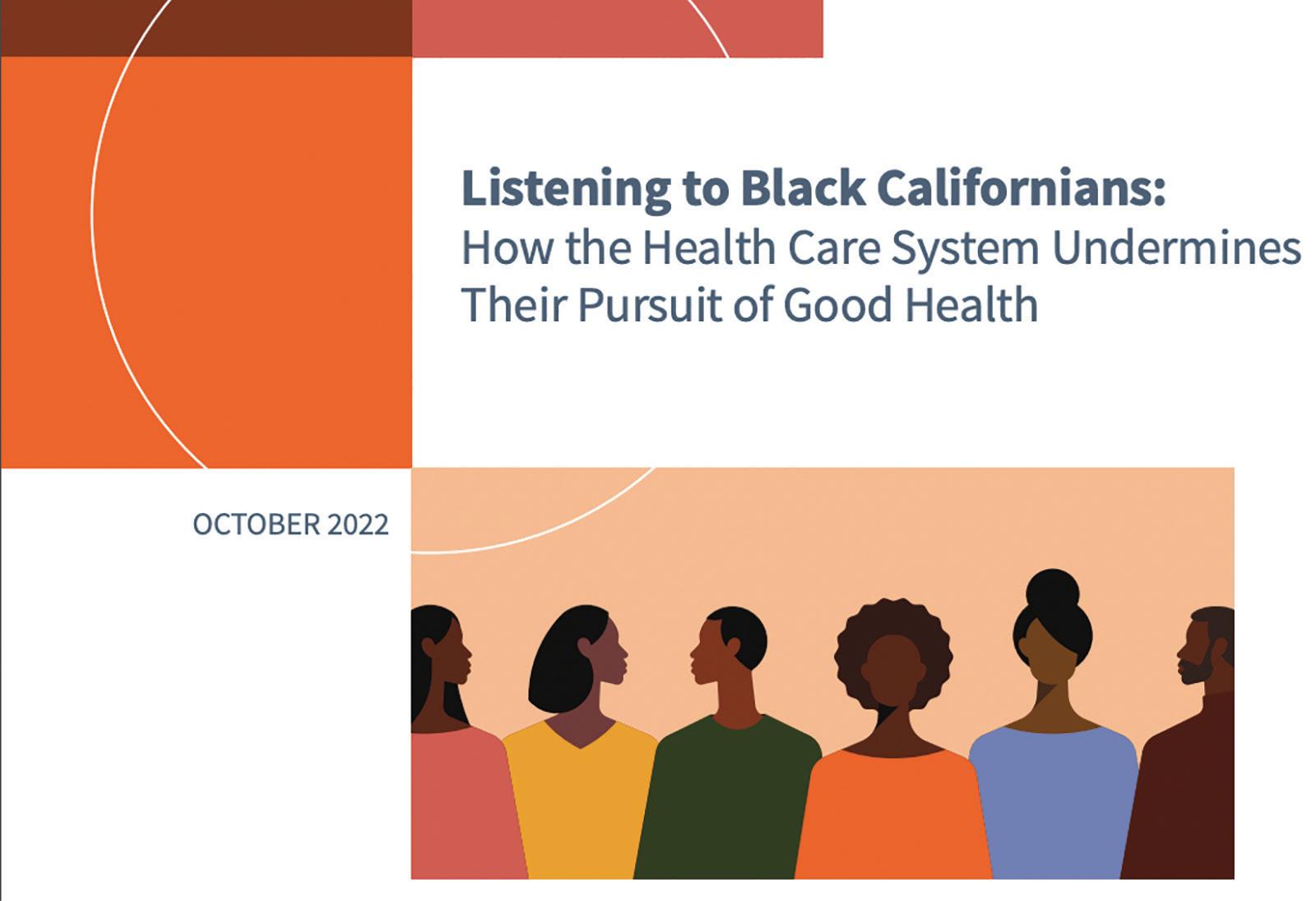
Haynes recommended one solution. “You can report it to your health plan. You can return it to the state licensing board. You can contact the Department of Managed Health Care, which oversees health plans and to the Office of the Patient Advocate. Those are those your rights,” said Haynes. “I will tell you that if you file a grievance versus a complaint, it poses legal liability and so those things that rise to that, or look like they might rise to that, are much more likely to get a response from a health care system.”
You can read the whole report here.
One Book Project : The Making of the News Observer with Editor James Luckey Jr.
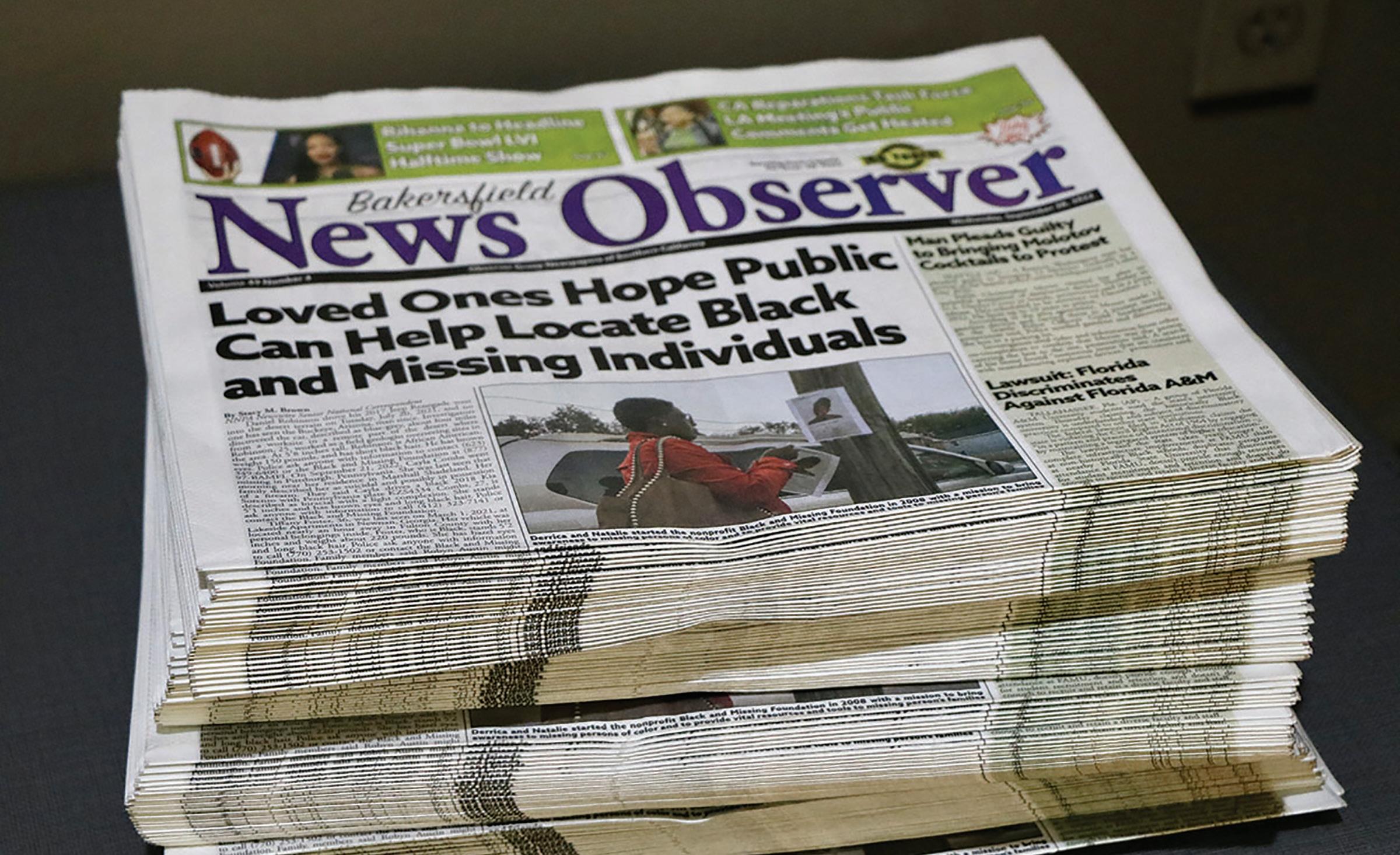 By Darlene L. Williams Contributing Writer
By Darlene L. Williams Contributing Writer
(Bakersfield, Calif.)—In an age of information where news, news, and more news is literally at one’s fingertips, whether credible or not, many may ask have printed newspapers become a thing of the past?
The One Book Project (a communitywide reading & discussion project inviting everyone to read and discuss the themes of equality and civil rights), sponsored by Kern County Library and California State University, Bakersfield hosted The Making of the News Observer with Editor James Luckey Jr., Tuesday, October 4, 2022 at the Beale Library.
The hour-long discussion shed much needed light on the birth, success, and content of the Black press newspaper, namely Bakersfield News Observer (BNO).
James Luckey Jr., Entrepreneur, Editor of Bakersfield News Observer, Los Angeles News Observer and The Valley News Observer, spoke passionately about the history and legacy of the News Observer newspaper and its founder, the late Joseph Coley.
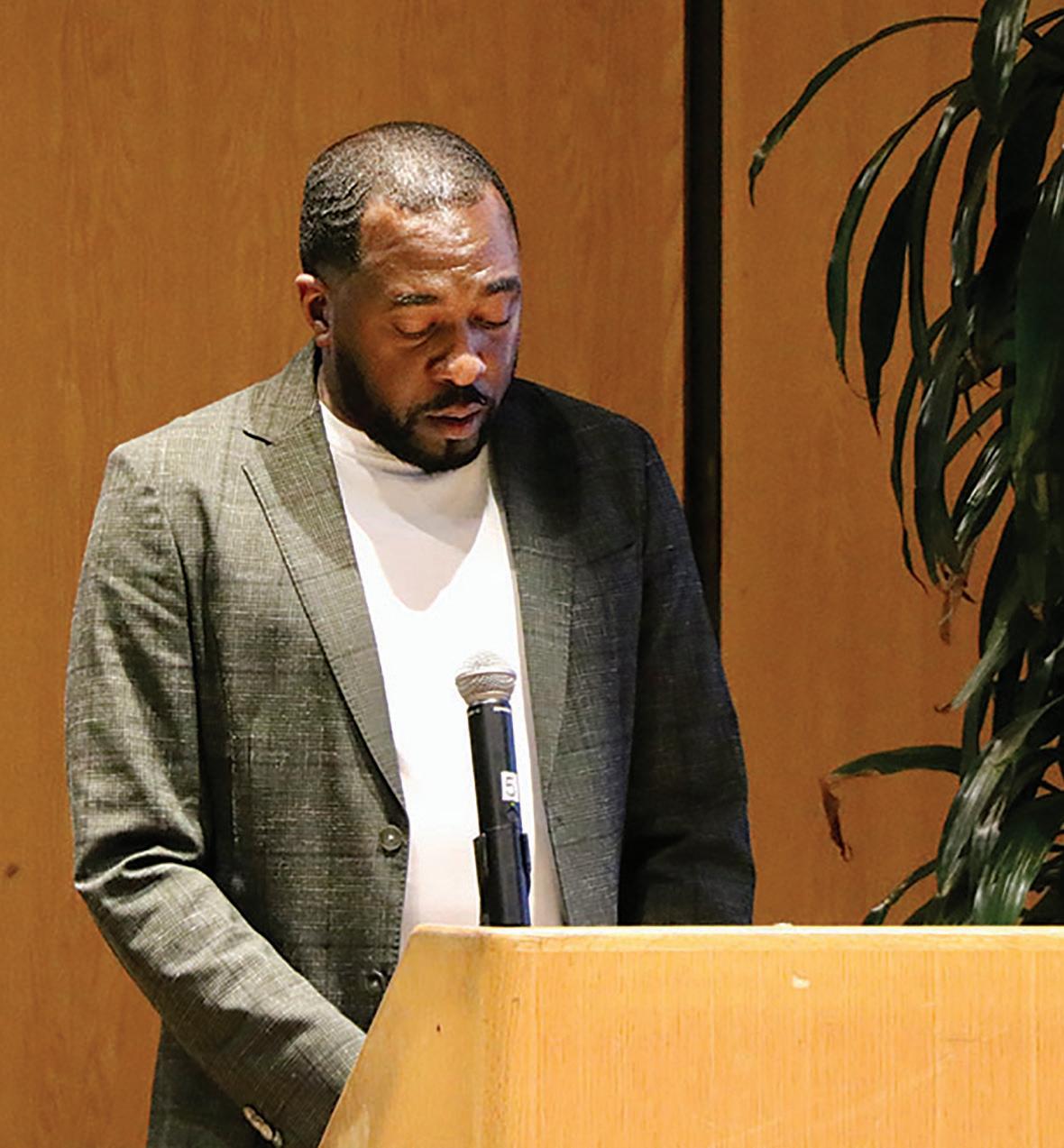
Luckey shared a glimpse into the life of Coley and the hard economic times which eventually led him to leave school early in his childhood. Taking on various jobs and eventually enlisting in the U.S. Navy, Coley would later return home to fulfill his life-long desire of returning to school. He enrolled into Bakersfield Adult School and graduated valedictorian of his class. Coley continued into the field of education and onto the campus of Bakersfield High School as a campus supervisor.
In 1974, to support his growing family, Coley started DDD a company that delivered hand-bills door-to door.

“It was during this time, Luckey said, that Mr. Coley met my grandfather, Ventura Watson who shared his idea of starting a community newspaper with the primary objective of the being the voice for the black community. And with the help of his wife, Ellen Coley, they established the newspaper.”
“Ellen was a fiercely made and civil-minded woman, Luckey said, “She made an exceptional addition to their team.”
In 1974 C&W Publications was birthed, later becoming known as the Bakersfield News Observer. Coley got inspiration for the name of his newspaper from the Charlotte News Observer in Charlotte, NC where he originated from.
Coley and Watson became game-changers in the way news was distributed and shared in the black community. And having knowledge of the fact that stories and events affecting African Americans communities would not be shared from their perspectives, or even shared at all, they began gathering local news as well as shared news from other black press platforms around the world and began distributing free newspapers to black households throughout Kern County.
“They shared the same conviction that the Black Press could be led a world away from racial and national antagonisms when it accounts for every person regardless of race, color, or creed”, Luckey said.
In 1984, BNO started its second and third publications, The Los Angeles News Observer and The Valley News Observer, which covers L.A, Lancaster, and
After the demise of Coley in 2000, as well as the demise of Watson; Ellen Coley took the reins and continued to publish the weekly newspapers addressing the concerns of the local African American community until her death.
Although the name of the newspaper has slightly changed, it stills holds true to its roots and the motivating purpose of representing the African American community, Luckey said.
Luckey, along with his father, James Luckey Sr. and the Coley’s youngest son, Jonathan Coley continue to move the vision of “spreading the news” into its forty-fifth year of service.
And now with expansion, growth, and technology, we are touching the lives of readers in Bakersfield and in Southern California Luckey said.
The News Observer continues to follow the vision of the Coley’s and Watson by getting news that matters and hits home to black communities weekly; come rain or shine.
BNO is the only adjudicated black press newspaper in Kern County. Luckey said, as he explained what being adjudicated means in terms of start-up businesses using fictitious names. DBA’s (Doing Business As) must be filed with the Kern County Clerk’s office and then published in a paper of general circulation such as BNO.
Although Bakersfield News Observer has been in operation longer than Luckey has been on earth, many in Kern County are unaware of the paper’s existence. Luckey briefly touched on the rejection and racism the paper still faces in Kern County.
Many local businesses and Medical clinics, with large African American clientele and patronization, have refused
the newspapers at their locations; some believing the papers are Muslim or revolutionary without even reading any of its content.
In sharing how the newspaper gets its content, Luckey stated that, roughly, there are 250 black press papers throughout the United States. We share news across a news wire with them and vice versa, they with us. It just keeps black communities informed about things that they should know, not only in their communities, but black and brown communities across the country.
For example, he further explained, when the tragic passing of rapper Nipsy Hustle happened in South Central Los Angeles, we were able to get coverage and share stories among ourselves that other newspapers couldn’t give.
I can speak from a personal standpoint of knowing Nipsy and his family. Our papers were distributed to the store where he was tragically killed. We were able to share his story in different newspapers across the country that couldn’t be on the front line to get his story.
Furthering explaining how content is gathered, Luckey spoke about the January 6th attack on the nation’s capital. While the Bakersfield News Observer was not in Washington, DC to get that story; however, one of the black press newspapers, The Washington Informer, was onsite firsthand and with a better perspective which afforded us the opportunity to publish those stories here in Bakersfield, he said.
“We cover a lot in our community, Luckey said, including sports and athletes. We try to follow those athletes who may have transitioned out of Bakersfield into the professional fields and/or are making positive moves in other colleges out of state. We cover UCLA, USC, The
Los Angeles Clippers, Los Angeles Lakers, NBA, and The L.A Rams”.
Luckey spoke excitedly of the LA News Observer covering the recent super bowl in Inglewood, Ca. “That was probably one of the greatest perks of the job, Luckey said (chuckling). I got to cover that firsthand and it was probably one of the greatest experiences of my life.”
Luckey alluded to the probability that many Millennials and Gen Z’s probably would not pick up a newspaper to read, he concluded that the black printed newspaper is still very much alive and functional; answering the question that newspapers are not a thing of the past.
When an attendee asked Luckey if the newspaper legacy would continue beyond him? He responded with the anticipated hopes that his inquisitive young nephew would one day take the torch and continue the strong legacy of the black newspaper.
The informative event ended with questions from the audience.
Readers can pick up printed newspapers at multiple locations around Bakersfield, including: Beale Library, The Bakersfield Police Department, Bakersfield College, CSUB, Albertsons and many other locations as well as BNO’s main office on 21st Street. All three newspapers can be accessed online at ognsc.com as well as enquiries about weekly subscriptions.
Bakersfield News Observer coverage of local news in Kern County is supported by the Ethnic Media Sustainability Initiative, a program created by California Black Media and Ethnic Media Services to support community newspapers across California.
